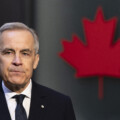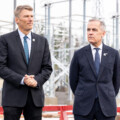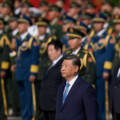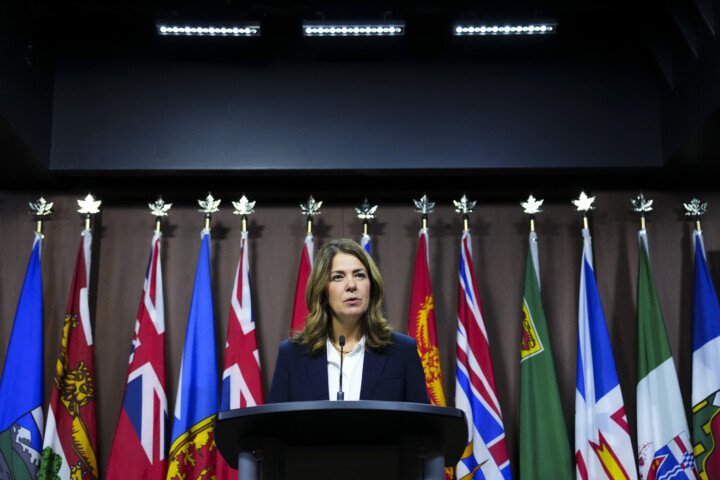Marking a major development in Ottawa’s relationship with the West, Alberta Premier Danielle Smith has announced the negotiation of a memorandum of understanding (MOU) with Prime Minister Mark Carney’s federal government that would see the waiving of environmental regulations and the suspension of the oil and gas production cap. The energy agreement outlines a path toward a new oil pipeline carrying a million barrels of oil a day from Alberta to the B.C. coast and onto Asian markets.
As The Hub’s Alberta bureau chief Falice Chan previously reported, Smith had been withholding political pot shots at Carney the past few weeks as the two leaders ironed out the details of the major agreement, which they finally announced early Thursday afternoon.
The MOU requires a carbon capture and storage project in Alberta in order for “one or more” new pipelines to be built by private financing. Both sides agreed to increase Alberta’s industrial carbon price and lower oil patch methane emissions. Meanwhile, Indigenous partners will be in “co-ownership” of the new project.
"It's a great day for Alberta. It's great day for Canada," says PM Mark Carney as he meets with Premier Danielle Smith before signing of Alberta energy deal. "This is Canada working. This is cooperative federalism," adds Carney.
— CPAC (@CPAC_TV) November 27, 2025
#cdnpoli pic.twitter.com/xU0gEfEG6J
Here are five Tweets from Canadian leaders responding to the announcement of the Alberta-Ottawa MOU for a potential new West Coast pipeline.
Premier Smith—the same week her United Conservative Party (UCP) announced new historical health care reform towards a public-private system and days before the UCP’s annual meeting—called the Ottawa-signed MOU a major victory for Alberta.
“This agreement means the end of the punitive oil and gas emissions cap so that our great energy producers can grow and thrive,” Smith said.
BREAKING:
— Danielle Smith (@ABDanielleSmith) November 27, 2025
The Alberta and Canadian governments have reached a historic agreement that will unleash the Alberta energy sector, create tens of thousands of jobs, and attract billions in new investment.
This deal includes the potential for an additional 1.4 million… pic.twitter.com/LIeg4kEKW3
Prime Minister Carney tweeted out a statement that highlighted his government’s target of “net-zero emissions by 2050.” The MOU states that the goal will be achieved through what is billed to be the world’s largest carbon capture storage project. The federal government claims it will add $16 billion in GDP and more than 40,000 jobs.
Premier @ABDanielleSmith and I have agreed to a framework built on shared ambitions — to achieve net-zero emissions by 2050, unlock the full potential of Alberta’s energy resources, and build a stronger, more sustainable, more competitive economy.
— Mark Carney (@MarkJCarney) November 27, 2025
Here’s what we want to…
“Of course, it’s a priority to have a pipeline to Asia. That’s going to make Canada stronger, more independent, more resilient, more sustainable,” Carney said at a joint press conference with Smith today.
One leader showing disapproval is B.C. Premier David Eby, who called the future project “fictional.” Earlier this week, the NDP leader expressed frustrations at being excluded from backroom negotiations between the Alberta premier and the prime minister.
“I feel like I’m watching a couple tourists wearing sandals wander into the woods on the north shore of Vancouver saying, ‘Don’t worry about us, we know where we’re going,’” Eby told CBC News. “They’re going to have to be rescued by a helicopter. And guess who has to send the helicopter?”
British Columbians know our coast and the opportunities it can unlock better than anybody else.
— David Eby (@Dave_Eby) November 21, 2025
We need to be at table to protect our coast, unlock prosperity and ensure a bright future for all Canadians. pic.twitter.com/SbJd8CE7OR
In a press conference after the MOU was unveiled, Eby said he was “anxious” given that the project had “no route,” “no proponent,” and does not have the support of coastal First Nations.
B.C. coastal Indigenous groups are already calling the MOU meaningless.
Coastal First Nations-Great Bear Initiative respond to @MarkJCarney @ABDanielleSmith pipeline MOU:
— Rob Shaw (@RobShaw_BC) November 27, 2025
“Today’s MOU does nothing to increase the chances of a pipeline project to the northwest coast ever becoming a reality. Coastal First Nations, along with the province of BC, will…
Eby added that it was a distraction from more worthwhile and promising energy projects in the region.
“We need to make sure the project doesn’t become an energy vampire,” Eby said.
Perhaps surprisingly echoing the NDP leader, federal Conservative leader Pierre Poilievre said the probability of a new pipeline getting built is next to zero when it is contingent on B.C. and Indigenous groups’ approvals.
“Alberta gets a bigger industrial carbon tax. The NDP Premier gets a pipeline veto. The Prime Minister gets headlines,” he wrote on X.
We need a pipeline.
— Pierre Poilievre (@PierrePoilievre) November 27, 2025
Carney delivered another pipe dream. pic.twitter.com/ev64hQGI8q
Meanwhile, Alberta NDP leader Naheed Nenshi released a statement broadly supporting the MOU agreement.
The new Canada-Alberta MOU is a positive step for our energy future.
— Naheed Nenshi (@nenshi) November 27, 2025
Meaningful investments in Pathways, clear measures to reduce emissions, and a stronger industrial carbon price give Albertans the certainty we need to move forward. /1
However, the Alberta opposition leader said pipeline capacity can’t be “the only strategy.”
“Alberta needs the full energy toolkit: oil and gas, renewables, expanding and investing in our electricity capacity, critical minerals, and advanced manufacturing,” Nenshi added.
Other political observers perceive the MOU merely as a political tactic by Prime Minister Carney. In their view, the manoeuvre placates Alberta’s aspirations for more pipeline capacity, while still allowing B.C. and Indigenous groups to block a new pipeline from getting to tidewater; all while claiming to still reduce carbon emissions to mitigate backlash from the green wing of the Liberal party.
Please enjoy my cartoon in today's @TorontoStar pic.twitter.com/AQ1XgiYVY0
— Theo Moudakis (@TheoMoudakis) November 26, 2025
Immediately after today’s announcement, Minister of Canadian Identity and Culture and long-time environmentalist Steven Guilbeault resigned from cabinet, protesting his government’s decision, which he said would have “major environmental impacts” especially in the Great Bear Rainforest.
Does this pipeline deal truly balance economic growth with environmental goals?
What are the biggest political hurdles facing this new oil pipeline project?
Could this MOU represent a significant shift in federal-provincial energy relations?









Comments (6)
The best news here is that Steven Guilbeault resigned